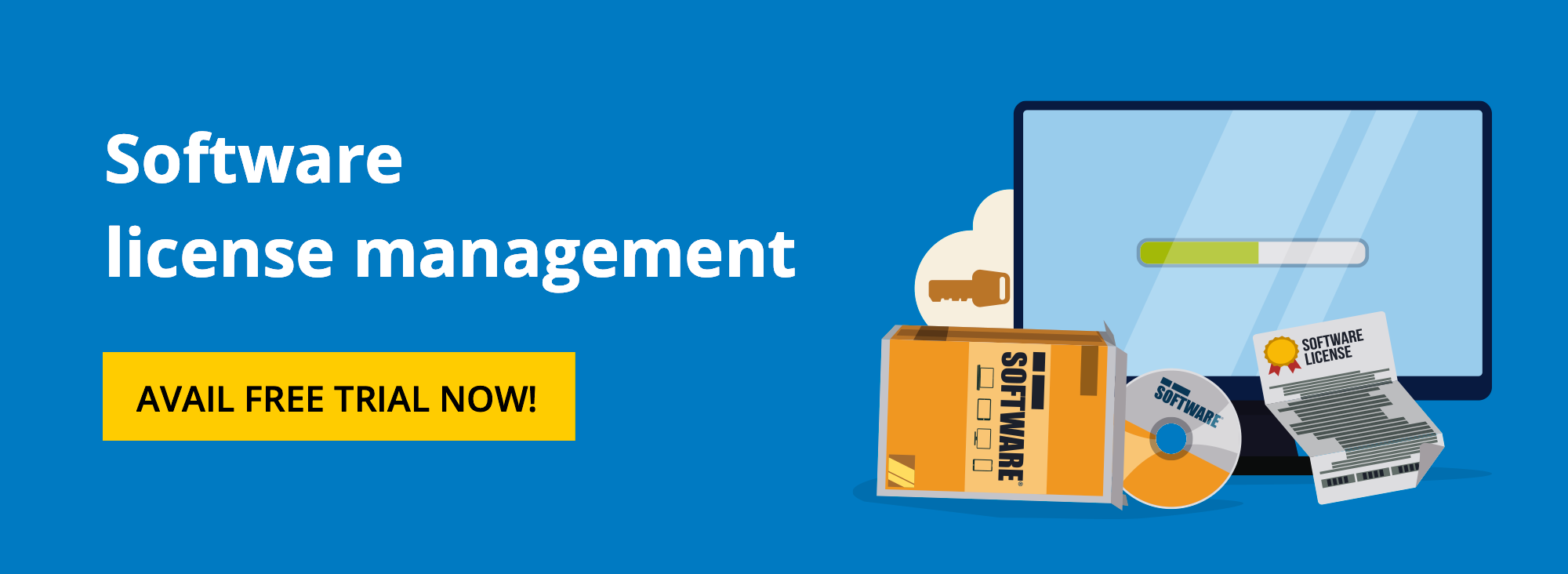What is software license management?

A software license is a legal document produced by the software publishers or distributors that provides rules and guidelines on the usage and distribution of the software. This document usually contains terms and conditions, restrictions, limitations, and disclaimers. Software license management is part of software asset management, which involves tracking, documenting, and controlling how and where software is used in your organization. A license management tool can assist you in complying with license agreements, i.e., end-user license agreements (EULA).
What is software license compliance?
Software license compliance is simply complying or adhering to the rules and regulations of usage and distribution outlined in the license while using the software. A software license is a legal contract that an organization agrees to in order to use software. Software publishers periodically conduct software compliance audits to check if the software licensing agreements are followed.
Endpoint Central - A Fast and Safe Software Audit tool
Software publishers such as Adobe or Microsoft periodically audit their clients' environments to detect, control, and prevent piracy, copyright infringement, and illegal use of software. To fail one of these software license audits could mean irreversible damage to a business' reputation, hefty fines, and potential legal action. A software audit tool can manage software licenses and help enterprises avoid the consequences of failing a compliance audit, and ensure software license compliance at all times.
Software Compliance - How important is it to an enterprise?
According to this study, 69 percent of IT executives are not confident in their compliance with their software licensing agreements. With software compliance rules getting more strict, it's become crucial to ensure unlicensed software is not part of your organization. This can be achieved by following these steps:
- Maintaining an up-to-date software inventory: Having complete visibility over the software installed within your network is imperative for achieving software compliance. To monitor and gain visibility on all software installations within the network, you need to run software inventory scans regularly.
- Real-time alerts for non-compliance: Set up real-time alerts for when you're under-licensed, so you can take action right away.
- Prohibit non-business applications: You can block non-business applications within your network to avoid running into surprises.
- Perform internal software license audits: With frequent internal audits, you can be confident that you are adequately licensed and avoid unexpected fines.
Achieving software license compliance is just one aspect of software license management. Managing software licenses also entails optimizing license usage to reduce IT expenditure. This can be achieved by:
- Monitoring the use of commercial applications to determine whether the licenses are being used efficiently.
- Cutting down costs by uninstalling applications from systems where they're not being used.
- Renewing licenses based on software usage statistics.
Risk factors involved in poor software license management
- In the absence of a software license management tool, there is no control over the purchased licenses in a network. This may lead to a few licenses that have already passed their expiry date being overlooked.
- A Software usage and waste report from 1E states that an average enterprise is wasting approximately $7.4 million every year on rarely and unused software. A software license management tool can provide a clear view on the number of software used in the network before the next software license renewal season. This can help you minimize unwanted expenditures.
- Software audits are conducted by software publishers in their clients' environments to check quality, standard, progress and regulations, etc. This is conducted to control and prevent piracy, copyright infringement, illegal use of software, and license compliance. Failing in one of these areas can cost an enterprise their reputation and potentially incur huge fines. Such circumstances can be prevented if you manage software licenses better.